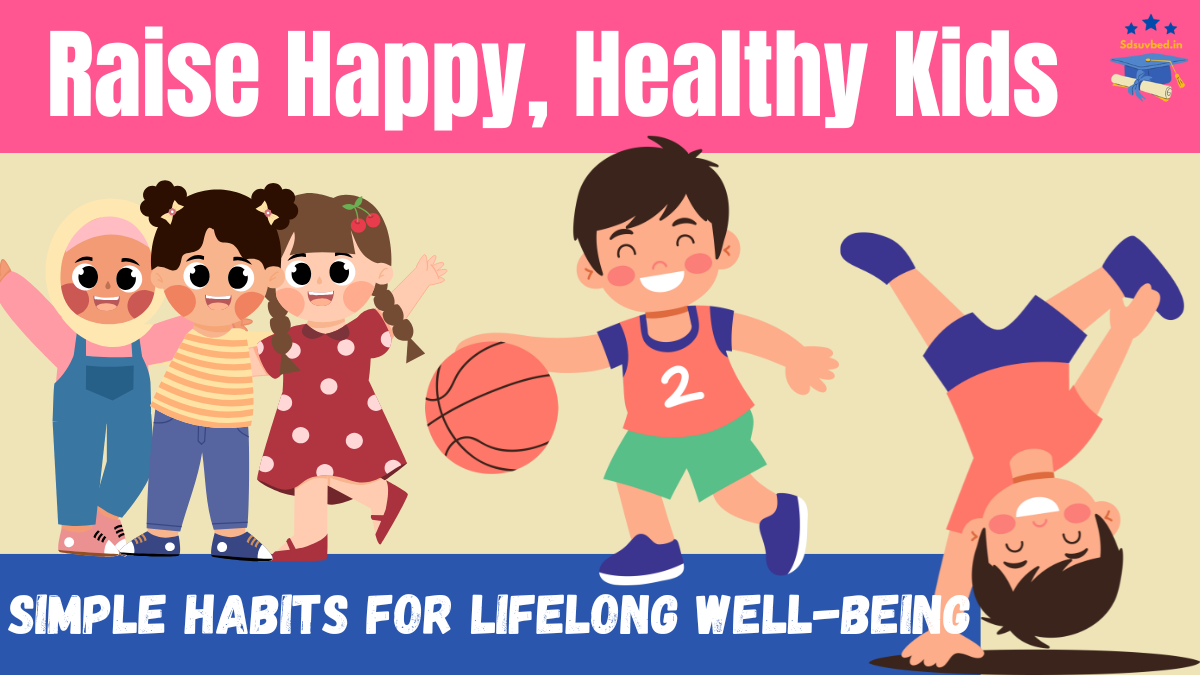The foundation of a child’s physical, emotional, and mental well-being is built through small, consistent habits. Raising a happy and healthy child doesn’t require drastic changes; instead, it involves daily routines, positive reinforcement, and mindful parenting. By setting good examples and encouraging the right habits, parents can ensure their children grow up strong, confident, and emotionally secure.

How Can Parents Instill Healthy Habits in Their Children?
Children learn more from what they see rather than what they are told. Parents play the biggest role in shaping their child’s lifestyle. Modeling healthy eating, physical activity, emotional regulation, and good hygiene encourages kids to adopt these habits effortlessly.
Dr. Shreya Dubey, a pediatrician and neonatology expert, emphasizes:
“Children learn more from what you do than what you say. The best way to encourage healthy habits is to model them yourself. From nutrition and hygiene to emotional well-being and physical activity, consistency is key.”
What Are the Essential Habits for Raising a Healthy Child?
1. Maintain a Balanced and Nutritious Diet
Nutrition is the foundation of a child’s growth, brain development, and immune function. A well-balanced diet should include:
- Fruits and vegetables for vitamins and minerals.
- Whole grains such as oats, brown rice, and whole wheat for sustained energy.
- Proteins like lentils, dairy, nuts, and lean meats for muscle and tissue growth.
- Healthy fats from nuts, seeds, avocados, and olive oil to support brain function.
Making meals fun by involving children in grocery shopping and food preparation can encourage them to develop healthy eating habits.
2. Teach Good Hygiene from an Early Age
Good hygiene is one of the most effective ways to prevent infections and maintain overall health. Dr. Dubey suggests making hygiene enjoyable by:
- Singing songs while washing hands to encourage proper handwashing.
- Allowing kids to choose their toothbrush and toothpaste to make oral care more exciting.
- Ensuring daily baths and clean clothing to instill self-discipline and confidence.
Teaching hygiene at an early age helps prevent illnesses and promotes self-care habits that last a lifetime.
3. Encourage Emotional Well-being and Mindfulness
A child’s emotional and mental health is just as important as their physical well-being. Parents should:
- Encourage open conversations about emotions and feelings.
- Teach mindfulness through deep breathing exercises and relaxation techniques.
- Provide a supportive environment where children feel safe expressing themselves.
Activities like journaling, storytelling, and positive affirmations help children develop emotional resilience and self-awareness.
4. Establish a Consistent Sleep Routine
Quality sleep is essential for a child’s growth, memory, and emotional regulation. A structured bedtime routine helps children wind down and improves overall health.
Healthy sleep habits include:
- Setting a fixed bedtime to maintain consistency.
- Avoiding screens at least one hour before bed to prevent overstimulation.
- Creating a relaxing bedtime environment with dim lighting and bedtime stories.
Children between the ages of 3-12 years need at least 9-12 hours of sleep per night for optimal development.
MUST READ: Armscor Bursaries 2025: How to Apply for Full Funding
5. Limit Screen Time and Encourage Real-World Engagement
Excessive screen time is linked to poor posture, sleep disturbances, and decreased attention spans. Parents can encourage alternatives by:
- Engaging children in interactive activities such as puzzles, board games, and arts and crafts.
- Encouraging outdoor activities such as sports, nature walks, or bike riding.
- Setting designated screen-free times, especially during meals and before bedtime.
Balancing screen time with real-world engagement helps children develop social skills and creativity while maintaining their physical well-being.
6. Build Strong Social Skills and Encourage Kindness
Social health is just as vital as physical well-being. Parents can support social development by:
- Teaching children respect, gratitude, and good communication skills.
- Encouraging acts of kindness and empathy towards others.
- Allowing children to interact and build friendships in different environments.
Children who develop strong social skills tend to be more emotionally intelligent and better equipped for personal and professional success.
7. Make Daily Physical Activity a Habit
Regular movement improves mood, reduces stress, and lowers the risk of lifestyle diseases. Parents should:
- Encourage outdoor play, including running, jumping, or cycling.
- Make exercise a family activity, such as hiking, dancing, or yoga.
- Integrate movement into daily routines, like stretching or walking after meals.
Instilling a love for physical activity in childhood promotes lifelong fitness habits.
Frequently Asked Questions (FAQs)
How can I encourage my child to eat healthier?
Making meals interactive by allowing children to participate in meal preparation and choosing colorful, whole foods can encourage them to eat healthier.
What are some effective ways to teach children about hygiene?
Turning hygiene into a fun and engaging activity, such as letting kids pick their soap or singing songs while washing hands, can make the learning process enjoyable.
How can I help my child develop emotional resilience?
Encouraging open communication, validating their feelings, and teaching relaxation techniques such as deep breathing can help children manage stress effectively.
What is the ideal amount of sleep for children?
Children between 3-12 years should get 9-12 hours of sleep per night to support their cognitive and physical development.
How can I reduce my child’s screen time?
Setting screen-free times, encouraging outdoor play, and replacing screen activities with interactive games or hobbies can help limit screen exposure.
What are the benefits of social skills development?
Children who develop strong social skills build better relationships, communicate effectively, and learn how to handle conflicts constructively.
How do I encourage physical activity in my child?
Making physical activity a family experience, enrolling children in sports, and integrating small movements into daily life can encourage regular exercise.
Click here to know more.
A passionate content writer specializing in creating engaging, SEO-optimized content. With expertise in blogs, web copy, and storytelling, I craft words that connect with audiences and deliver results.
